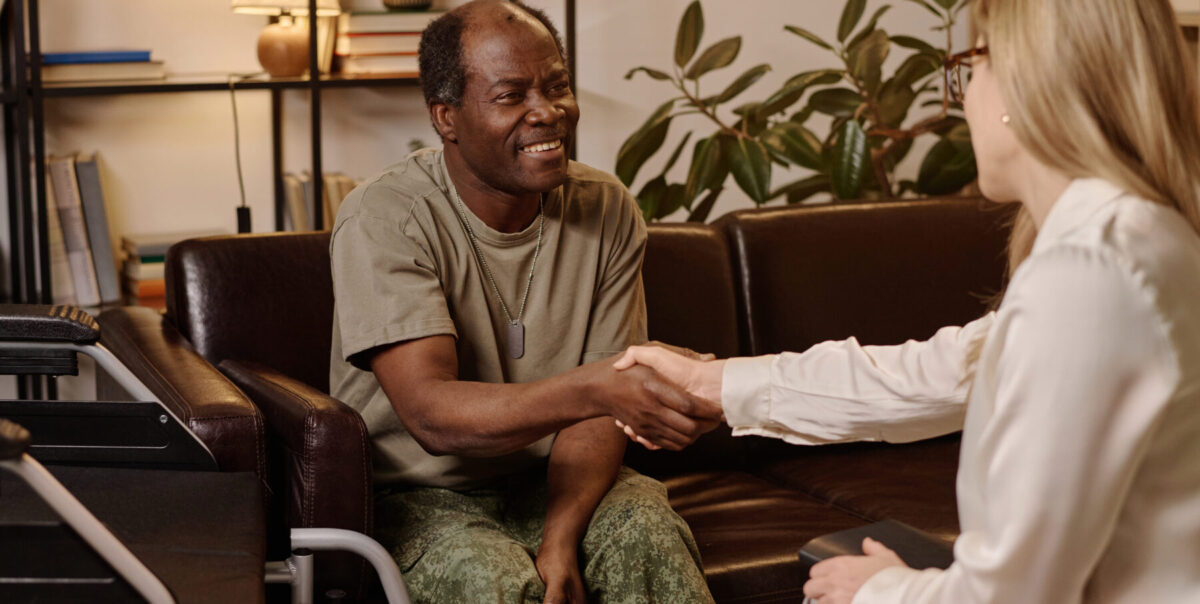
Veterans have access to a number of types of long-term support services through the VA, including 24-hour nursing care, rehab, and physical therapy. When they meet certain criteria, they can receive assistance with daily routine tasks like dressing, bathing, meal prep, and medication management. Veterans are offered resources for pain management, mobility, and personal care, while caregiver respite programs provide benefits so families of veterans can have a break to ensure their own self-care.
U.S. veterans are eligible for VA long-term care benefits if they’re enrolled in the VA health system and need medical support, show a demonstrated need for daily living assistance, or have a service-related disability. If you’re a veteran, you must have access to local VA services near you to be considered eligible. In certain circumstances, the VA will also sometimes consider your age, chronic health condition, or the needs of your caregiver when determining eligibility for long-term care services.
Some private nursing homes are contracted with the VA to provide comprehensive care for veterans. They support their long-term medical and personal care needs so they can live near family and friends, in familiar surroundings. Dedicated nursing home staff and nurses provide 24-hour care when needed for complex conditions, including pain management and specialized dementia care, and hospice services. From daily routine care to end-of-life comfort, private nursing homes ensure consistent and compassionate care is offered to their veteran residents.
A partnership between individual state governments and the VA provides access to state-run VA nursing homes for veterans, which are partially funded by the VA. More than 100 Community Living Centers for veterans exist around the United States. Veterans need to reside in the state, need medical care, and have received an honorable military discharge to receive services.
Veterans can also receive nursing home-level care from nurses and other medical professionals at VA facilities called Community Living Centers. Some veterans stay for the remainder of their lives, while others stay temporarily for rehabilitation.
VA benefits for assisted living may provide partial funds for essential care so independent veterans can live in a safe, supportive assisted living community. Pension enhancements or care coordination programs assist veterans in covering the cost of their care and the financial burden on families in assisted living facilities, because the VA doesn’t typically cover costs for room and board at them.
Veterans who want to live in a smaller, home-like environment may prefer an adult foster home. They include residential support from a caregiver for a few veteran residents who need help with daily living and basic health needs. VA benefits help cover the cost of living in these settings.
Several options are available for veterans who want to stay and live in their own homes but need assistance managing their chronic health conditions and help with daily tasks. Adult day care offers daytime support but allows them to return home afterwards. If a veteran lives at home and needs hospice or palliative care, these services are also available.
Home health aides are available for veterans who need help with medication management and personal care. Adult day care centers provide structured activities and social engagement that also give respite to caregivers. Hospice programs provide services for veterans who need end-of-life care in their homes. Telehealth services enable veterans and their caregivers to link with providers remotely so they can manage their health needs from home and don’t need to travel.
With veterans benefits for elderly care, aging in place supports veterans when they want to stay in their homes. The layers of support services can ease the family’s burden for care.
Not every VA service is covered by the VA or free, especially if your condition isn’t related to military service.
The VA encourages veterans to retain their private health insurance policies because they sometimes pay for services the VA doesn’t cover, such as outpatient copays or some prescriptions. Combining VA benefits, private insurance, and Medicare or medicaid benefits will avoid coverage gaps and reduce veterans’ out-of-pocket expenses.
VA assisted living benefits for a surviving spouse include funeral costs, insurance, access to counseling, access to VA-backed home loans, and educational support. Eligibility for spouses depends on the length of their marriage to the veteran, their income, and whether the veteran served during a war.
VA Respite care and assistance are available for caregivers to prevent burnout and provide temporary relief.
How to Apply and Get Help and Who to Contact
Enrollment basics for VA benefits include submitting form 10-10 EZ online, via mail, or in person at a VA facility. Be ready to provide proof of income and discharge papers. After these are received, the veteran will be assigned a priority group based on their service history. Social workers at VA hospitals, the health benefits hotline, or the VA website can detail each step.
Discover the key differences between retirement homes and assisted living to help you choose the right care for your loved one’s needs.
Discover the key differences between retirement homes and assisted living to help you choose the right care for your loved one’s needs.
Discover the key differences between retirement homes and assisted living to help you choose the right care for your loved one’s needs.
Learn the risks of leaving a dementia patient alone, legal responsibilities, care strategies, and how to plan for their safety.